We’ve been told ever since we were little that we need to share with other people. Whether it’s our toys, our feelings, or our space, we were told that we get more out of sharing than we give up. Thanks to technology, though, we’ve taken those ideas of sharing, and expanded them. We now have a sharing economy, and it has completely revolutionized the way we do things.

Understanding The Sharing Economy
When you hear the term “sharing economy” it probably brings to mind some kind of communal living situation. Something that’s halfway between a hippie free-love community, and a kind of off-grid farming town where everyone depends on everyone else to pitch in. That isn’t really what the sharing economy is, though.
So what is it, then? Well, the sharing economy is an umbrella term that typically refers to people being able to rent or borrow assets used by someone else. These kinds of economies are most common when it comes to expensive assets that are prohibitive to own, but which the owners aren’t using all the time.
There are all kinds of sharing economy businesses in today’s world. Uber, for example, brings together people who own a car with people who need a ride. Cars are expensive, but those who own them don’t typically use them all the time. So renting out a car to give someone a lift benefits everyone. The owner gets a fee, and the rider gets the benefit of transportation without the cost of owning and maintaining the car. This can be especially beneficial in big cities, where you have to pay fees just to park your car somewhere.
Cars are just the tip of the ice berg. There are sites that let people turn their homes, or even apartments, into temporary lodging such as Air BNB. Reselling and trading sites like Ebay allow people to buy, sell, and trade objects on a market that didn’t exist before the Internet. People can lend each other money, both on a personal basis, and through sites like Lending Club or Prosper, which can be ideal for those who don’t want to use the traditional banking system.
Profits For Companies, Advantages For Consumers
The sharing economy provides major advantages for consumers, as well as for the providers. Whether it’s ride-sharing, or couch surfing, or sharing office supplies (something that freelancers often do as a way for them to collectively bargain, and share out what they need), everyone gets something they want. The consumers get access to a good or service that they normally wouldn’t, and those who provide the good or service get a fee for providing that access.
But what about the companies? What do they get out of the sharing economy?
Well, the companies get a cut of the action. Every company who builds a sharing economy platform, takes a small percentage of every transaction. They are charging for access to the network that they’ve created, and though the amount of any given transaction is tiny, the cumulative total has been enough to build billion-dollar businesses.
That’s the brilliance of a sharing economy platform from the perspective of a business; they don’t have to physically make something. They’re simply creating a network that brings together people who need something, with people who have that something. Being able to do that for little cost, and without the need to maintain any physical assets like the cars, houses, etc. that are being shared, means that everyone is getting what they want.
For more information on the sharing economy, and how it’s affecting the way we live our lives, simply contact us today!

